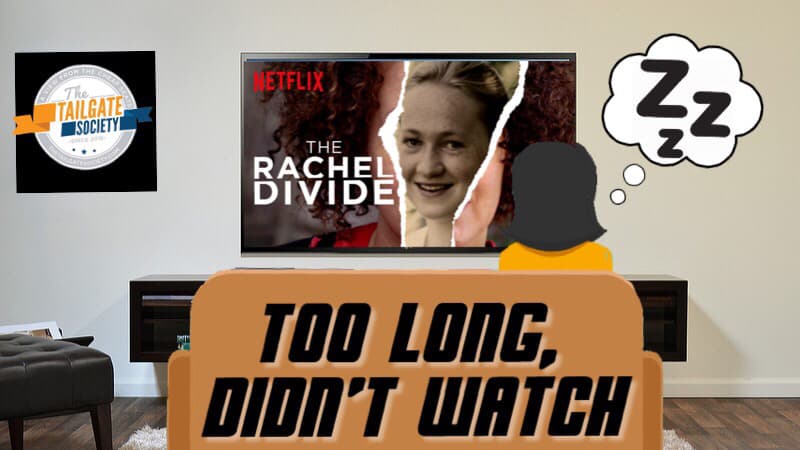It seems like every week brings a new must-watch documentary. As much as we want to stay updated and able to participate in the latest water cooler fodder, there’s only so many hours in a day. Too Long; Didn’t Watch will be bringing you summaries and reviews of the biggest documentaries so you can be well-informed, without making watching Netflix your part-time job. First up: The Rachel Divide.
Rachel Dolezal overtook the entire news cycle in 2015 when it was revealed that the outspoken president of the Spokane chapter of the NAACP was actually born to white parents and had been taking steps to change her appearance to portray herself as black. This included tanning and getting perms and weaves in her hair. She had been calling herself black and African-American to others and on official forms for a number of years. After being at the forefront of several influential protests, this revelation sent shockwaves throughout the NAACP, African-American community, and the US as a whole.
When the news broke, many were quick to dismiss her as hungry for attention or mentally ill. While those accusations may still ring true for some, this documentary shows that the issue is significantly more nuanced than that. Dolezal was raised by parents she and some of her siblings characterize as highly physically and emotionally abusive. When they adopted three black children in Dolezal’s teenage years, she first started having feelings of identifying more closely with them than with her own heritage.
[media-credit id=5 align=”alignnone” width=”488″] [/media-credit]
[/media-credit]
She began more frequently expressing African-American themes in her art, culminating in receiving a full scholarship to historically black Howard University. It is assumed that, based on her work, they had assumed she was black when awarding her the scholarship. From there, she continued to explore themes relevant to African-American history and culture in her work, leading some to wonder whether she was qualified to do so given she was not of that heritage.
Between her time in school and being thrust into the media spotlight, she changed her appearance, took in her own adopted siblings, and began referring to a black family friend as her father. When the revelation that she was not who she claimed she was broke, many conflicting reactions abounded. For some, it was just the latest in a long line of drama surrounding her. She had allegedly received substantially more hate mail than other NAACP leaders in her time there, and some believe she had sent it to herself. Others, though, sympathized with her, and lent credence to her claims of being “transracial”.
Throughout the film, it is evident that the issue is significantly more complex than it initially appeared. Her biological son Franklin becomes increasingly frustrated with the situation, lamenting her inability to stay out of the public eye and refusal to accept her true identity. Her adopted brother-turned-son Izaiah leaves the country so he can focus on himself, instead of being seen as a relative of hers. Her adopted sister, Esther, discusses her suit against Dolezal’s biological brother for sexual assault, which ends up being dropped possibly partially because Rachel is no longer seen as a credible witness. Finally, near the end of the film, she also gives birth to a new son and discusses the hopes she has for him going forward. This includes being able to live her life the way she wants, but she seems unwilling to secure this same future for her children by doing such simple things as giving up social media to take them out of the public eye. She constantly shares their actions and still seems surprised to receives hate, which lends credibility to her critics who paint her as a professional victim.
This documentary is INCREDIBLY dense. There are a lot of connections that would never be seen from the outside and dynamics that lend new layers to the story people think they know. Dolezal is completely unapologetic in her actions. While the film gives new context to what is already known, her lack of remorse or changes to her portrayal of herself mean it is unlikely to change many people’s opinion of the situation. Dolezal is potentially a victim of abuse, hate, and circumstance, but she is also unquestionably the perpetrator of, at best, a campaign of indirect misinformation and at worst, a dangerous and willful misleading of the public.

